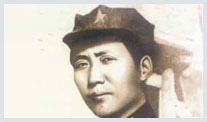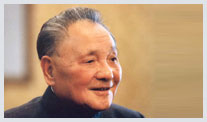|
Entering a new era: Great achievements 
|
| 2002-11-11 09:29:31 |
 More than 10 years ago, when people spoke of the market economy, they were still doubtful about its feasibility in China. But today, "market economy" has become one of the most frequently used buzzwords in China. The establishment of China's socialist market economy is a huge achievement in the country's economic restructuring, as well as a great feat by the Communist Party of China. More than 10 years ago, when people spoke of the market economy, they were still doubtful about its feasibility in China. But today, "market economy" has become one of the most frequently used buzzwords in China. The establishment of China's socialist market economy is a huge achievement in the country's economic restructuring, as well as a great feat by the Communist Party of China.
People will not forget the meeting held in Beijing one December day in 1978. It was a significant moment in the history of China when the 3rd Plenum of the 11th CPC Central Committee paved the way for China's economic restructuring.
In the spring of 1992, while inspecting south China, the late senior leader, Deng Xiaoping, stated that a planned economy was not equal to Socialism and a market economy did not exclusively mean Capitalism. His remarks signaled China's economic structure was at the point of changing.
In 1992, when addressing the 14th National Party Congress, General Secretary Jiang Zemin made it clear that China's goal in economic restructuring was to establish a socialist, market-driven economy which ensures economic activities.
Bold structural reforms were also introduced into areas including finance, taxation, trade, foreign currency, residents' housing, and social security. Thereafter China's economy moved into the fast lane.
 Years later, the newly restructured economic system stood up against a severe test.
Years later, the newly restructured economic system stood up against a severe test.
In July 1997, a financial crisis hit Asia like a storm. The resulting turmoil caused continued fluctuations in the international financial market and China's aggregate foreign trade growth showed considerable decline. To ease the impact of this crisis, the Chinese government resisted pressure and kept its currency stable. China also played a key role in stabilizing Asian financial markets and preventing the global economic situation from getting any worse.
"During the Asian financial crisis, China undertook an expansionary fiscal policy aimed at increasing domestic demand, so that its currency, the Renminbi, maintained its stability and its economy kept growing. This policy also ensured China could provide support to other Asian countries, showing China is a responsible nation," said Wang Mengkui, director of State Council Development Research Center.
After the 3rd Plenary Session of the 14th CPC Central Committee, state-owned enterprises began a pilot program of setting up modern enterprise management systems.
From 1989 to 2001, China's state-owned enterprises' profits increased from just less than 8 billion US dollars, to around 30 billion US dollars. Total state-owned assets reached a value of more than 1.2 trillion US dollars.
China's agriculture industry also made historical leaps and bounds. By the end of 2001, population in poor areas decreased to 28 million, 220 million people less than when the reform and opening-up policy were first initiated.
Figures can tell more about China's reform achievements more clearly. From 1989 to 2001, China's gross domestic product increased from nearly 1.7 trillion yuan to 10 trillion yuan, or 1.2 trillion US dollars, that represents an annual increase of 9.3 percent, placing today's China as the number six in the world.
Today's China is striding ahead steadily on the road of Socialism with Chinese characteristics, and it is revealing more than ever the boundless charms of an Eastern Giant.
|
|










